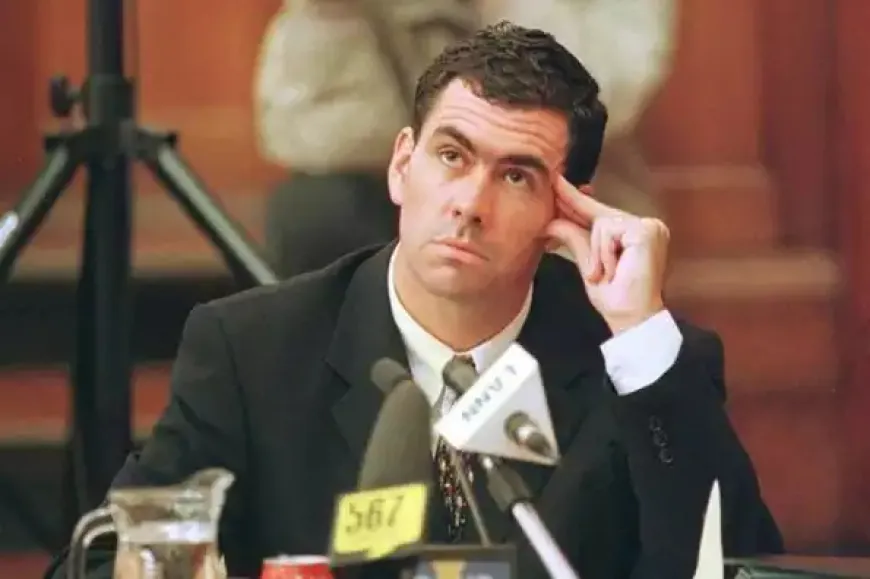The Cricketer and the Cleric: A Reflection on the Lives of Cronje and McCauley
The relationship between the cricketer and the cleric developed over time, with Cronje visiting McCauley's home and sometimes staying overnight. When Cronje contemplated resigning due to the United Cricket Board's transformation policies, it was McCauley who was called upon to persuade him to stay. This bond culminated in a heartfelt letter from Cronje to McCauley, faxed in the early hours of April 11, 2000, following his involvement in a match-fixing scandal. The letter revealed Cronje's inner turmoil, expressing his feelings of weakness and the struggle to maintain his faith amidst the chaos.

In the realm of the afterlife, it’s intriguing to consider what conversations might have transpired between Hansie Cronje and Ray McCauley, who hadn't spoken for over two decades. Their unexpected reunion sparks curiosity about the exchange of experiences and reflections on their complex lives.
Cronje, the former South African cricket captain, met an untimely end at the age of 32 in a plane crash in June 2002, while McCauley passed away last Tuesday, just a week after celebrating his 75th birthday. The specifics surrounding McCauley's death remain undisclosed, but both men were prominent figures in South Africa, each holding significant influence in their respective spheres.
Despite their different paths, both Cronje and McCauley shared a common bond as devout Christians. Cronje was deeply influenced by the evangelical style preached by McCauley at the Rhema Bible Church in Johannesburg. Their connection began during the Wanderers Test against India in November 1992, when Kepler Wessels, the former captain, introduced McCauley to the team. Following Wessels' departure, Cronje assumed the captaincy in November 1994, and McCauley became increasingly close to the players, eventually serving as an unofficial chaplain.
The relationship between the cricketer and the cleric developed over time, with Cronje visiting McCauley's home and sometimes staying overnight. When Cronje contemplated resigning due to the United Cricket Board's transformation policies, it was McCauley who was called upon to persuade him to stay. This bond culminated in a heartfelt letter from Cronje to McCauley, faxed in the early hours of April 11, 2000, following his involvement in a match-fixing scandal. The letter revealed Cronje's inner turmoil, expressing his feelings of weakness and the struggle to maintain his faith amidst the chaos.
In his letter, Cronje admitted to succumbing to temptation and acknowledged the devastating impact it had on his life. He wrote: "In a moment of stupidity and weakness, I allowed Satan and the world to dictate terms to me." This moment of vulnerability highlighted the depth of his faith and his desire to seek redemption, positioning himself as a cautionary tale for others. McCauley, who had publicly supported Cronje during the initial allegations, reaffirmed his belief in Cronje's integrity, stating that he could not believe the cricketer would be involved in such wrongdoing.
As the investigation unfolded, the Delhi police presented evidence of Cronje's connections to the illegal gambling underworld, including taped conversations. Despite his initial denials, Cronje ultimately confessed to his involvement, leading to a lifetime ban from cricket. This fall from grace contrasted sharply with the financial career he pursued after leaving the sport, working as a financial manager for an earth-moving equipment company—an appointment that many viewed with skepticism given his controversial past.
The story of Cronje's downfall resonates with the tale of Mohammad Azharuddin, the former Indian captain, who also faced a lengthy ban for match-fixing but successfully appealed to have it lifted years later. The comparison raises questions about the potential for redemption in the world of cricket, where a player’s reputation can be irreparably damaged. Cronje's connections with illegal bookmakers and the sums exchanged, including a $30,000 payment to ensure South Africa lost a crucial match, serve as a reminder of the darker side of sport.
While Cronje struggled with integrity and morality, McCauley's own life was marked by contradictions. A former nightclub bouncer and bodybuilder, McCauley preached the "prosperity gospel," a belief that God would bless his followers with wealth. His own opulent lifestyle, which included expensive cars and multiple homes, served as a testament to his teachings. McCauley mingled with influential figures, including Nelson Mandela, and his Rhema Bible Church evolved into a grand establishment, complete with a helipad.
Yet, McCauley's approach to faith and politics also drew criticism. He criticized political engagement within the church during apartheid while simultaneously cozying up to those in power. His shifting principles and opportunistic alliances raise questions about his authenticity as a leader of faith. His rhetoric sometimes contradicted the actions he took, including his initial hostility towards Mandela, whom he later embraced once the political landscape shifted.
Should Cronje and McCauley have found themselves in the same metaphysical space, they might have exchanged astonished glances and pondered the path that led them there. Their journeys were intertwined through shared beliefs, yet diverged dramatically in their actions and consequences. The lives of both men encapsulate the struggle between integrity and temptation, faith and hypocrisy, leaving behind a legacy that continues to provoke discussion.
Ultimately, the legacies of Hansie Cronje and Ray McCauley stand as complex narratives of redemption, ambition, and moral conflict. Their paths crossed in life, shaping the experiences of many in South Africa and beyond. The meeting of these two figures in the afterlife, should it occur, might lead to profound reflections on the choices they made and the impact of their lives on those who looked up to them. What they might have said to one another could reveal a shared understanding of the trials they faced and the lessons learned along the way.





















































